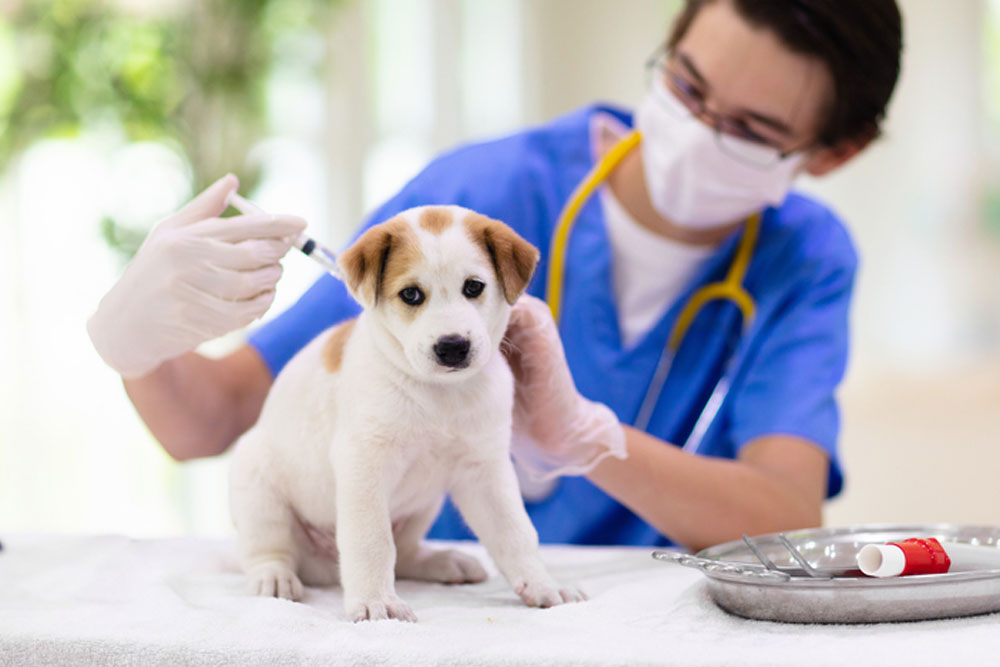Navigating the Vaccination Process
Whether you’re welcoming a new puppy or kitten into your home, caring for a healthy adult, or managing the health of a senior pet, understanding their vaccination needs is crucial.
At Tamberly Animal Hospital, we believe in proactive, preventive care. Our team follows the latest vaccination protocols tailored to your pet’s lifestyle, age, and risk factors. We’re committed to your pet’s long-term health and to building a lifelong partnership with you.
Explore our full range of veterinary services or request an appointment today.
Understanding Pet Vaccinations
Why do pets need vaccinations?
Vaccinations are one of the most effective tools in veterinary medicine for preventing disease. Vaccines work by triggering an immune response that builds protection without causing the illness itself. This immunologic memory helps your pet’s body recognize and fight off specific pathogens if they’re ever exposed.
Vaccinations are essential for protecting pets from common—and often deadly—diseases. Diseases like rabies, canine parvovirus, distemper, and feline panleukopenia can lead to severe illness, costly treatment, and even death.
Learn more from the AVMA’s Vaccination Guidelines for Pet Owners.
Vaccination Guidelines for Every Life Stage
Puppy & Kitten Vaccination Schedule
When should vaccinations start?
Most puppies and kittens begin their core vaccine series at 6–8 weeks old, with boosters every 3–4 weeks until 16–20 weeks of age.
Core vaccines for dogs include:
- Distemper
- Parvovirus
- Adenovirus (Hepatitis)
- Rabies
- Leptospirosis
- Bordetella (Kennel Cough)
Learn more from AAHA’s Canine Parvovirus Update and Kennel Cough Information from the AVMA.
Core vaccines for cats include:
- Feline Herpesvirus (FHV-1)
- Calicivirus
- Panleukopenia (Distemper)
- Rabies
Review the AAHA Feline Vaccination Guidelines and Cornell’s Vaccine Risk Overview.
Adult Dogs and Cats
Once the initial series is complete, adult pets require booster vaccinations to maintain immunity. Most core vaccines are boosted annually or every three years, depending on the vaccine and your pet’s risk.
Lifestyle-based vaccines may be added, including:
- Lyme Disease: Especially for dogs in wooded or tick-prone areas. AVMA on Lyme Disease in Dogs
- Leptospirosis: Transmitted via standing water or wildlife. AAHA’s Guide to Leptospirosis
- Canine Influenza (Dog Flu): Highly contagious. AKC’s Canine Flu Guide
- Feline Leukemia Virus (FeLV): Especially important for cats with outdoor access. Cornell Feline Health Center: FeLV
Senior Pets
Do older pets still need vaccines?
Yes. While some vaccine intervals may change, senior pets are more vulnerable to infections due to age-related immune decline. Keeping up with core boosters and assessing exposure risk annually is still crucial.
Discuss a personalized vaccine strategy during your senior pet’s wellness visit. Learn more about pet life stages and health needs for dogs and cats.
Understanding the Core Vaccines
| Vaccine | Protects Against | Species | Notes |
|---|---|---|---|
| Rabies | Rabies Virus | Dogs & Cats | Required by law in many states |
| DHPP | Distemper, Hepatitis, Parvovirus, Parainfluenza | Dogs | Core for all dogs |
| FVRCP | Feline Viral Rhinotracheitis, Calicivirus, Panleukopenia | Cats | Core for all cats |
| FeLV | Feline Leukemia Virus | Cats | Core for kittens; optional for adults based on lifestyle |
| Bordetella | Kennel Cough | Dogs & Cats | Recommended for social pets |
| Leptospirosis | Leptospira Bacteria | Dogs | Risk-based |
| Lyme | Borrelia Burgdorferi | Dogs | Risk-based |
| Canine Influenza | Canine Flu | Dogs | Risk-based |
Vaccine Side Effects: What’s Normal and What’s Not

Mild side effects are common and usually resolve within 24–48 hours. These include:
- Mild fever
- Decreased appetite
- Temporary lethargy
- Soreness at the injection site
Severe allergic reactions are rare but serious. Signs include:
- Swelling of the face or limbs
- Vomiting
- Difficulty breathing
- Collapse
If you notice any of these, seek veterinary care immediately.
Maintaining Your Pet’s Vaccination Schedule
Staying on schedule is one of the best things you can do for your pet’s long-term health. Consider setting up annual wellness exams to review vaccination status, parasite prevention, and other preventive care measures.
Need help remembering? Ask us to set up reminder notifications or download a pet health app for tracking.
See why regular veterinary visits matter.
Schedule Your Visit to Tamberly Animal Hospital
Vaccinations are a vital part of a lifelong preventive care plan. At Tamberly Animal Hospital, we tailor every vaccine protocol to fit your pet’s unique health needs, environment, and risk level. Our compassionate, experienced team is here to help you keep your pet safe and thriving at every stage of life.
Ready to get started?
Visit our Services Page or Request an Appointment now. For questions, feel free to Contact Us.
Protecting your pet starts with a single shot—but it lasts a lifetime. Let’s keep them healthy, together.







Leave A Comment